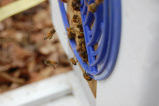|
In recent years, a growing trend has emerged among scientists and enthusiasts alike – the practice of assigning human names to wild animals, particularly sharks. While the intention behind this practice may be to foster a sense of connection and relatability with these animals, it inadvertently introduces a significant barrier to objective scientific research.
The humanization of wild animals, whether through naming or anthropomorphizing their behavior, blurs the lines between humans, insects, and animals, diminishing their intrinsic value as distinct species. When we assign human names to wild animals or queen bees, we inadvertently elevate them to a status akin to pets, companions, or even family members. This emotional attachment can cloud our judgment and hinder our ability to perceive them as the wild, unpredictable creatures they truly are. This humanization can have negative consequences for scientific research. When we perceive an animal as an individual with a name, we tend to view its behavior through a subjective lens, attributing its actions to human-like motivations or emotions. This subjective interpretation can lead to biased observations and flawed conclusions, ultimately distorting our understanding of their natural behavior and ecology. Moreover, assigning human names to wild animals can inadvertently foster a sense of familiarity and comfort that can lull us into a false sense of security. This perceived familiarity can lead to underestimating the potential dangers posed by these animals, particularly those known for their predatory behavior. The practice of naming wild animals is particularly problematic in the context of species like sharks. Sharks, often portrayed as menacing predators, have long suffered from negative public perception. Assigning human names to these animals can reinforce these negative stereotypes and potentially increase the risk of human-wildlife conflict. A woman on Instagram swims with Tiger Sharks she has named off the coast of Hawaii. She shows how to redirect a Tiger Shark she has named them. How many people have seen these videos and may decide to try this ill-advised stunt themselves? Instead of humanizing wild animals, scientists and enthusiasts should focus on fostering a deeper understanding of their biology, behavior, and ecological roles. By appreciating their unique adaptations and the delicate balance they maintain within ecosystems, we can develop a more respectful and sustainable relationship with these remarkable creatures. Names help keep us keep track of the animals and insects we study but they should be sterile and use numbers or subject identifiers.
0 Comments
Leave a Reply. |
Details
SEABEE HONEY BLOGAuthorA beekeeper in New Hampshire [email protected] Archives
December 2023
Categories
All
|

 RSS Feed
RSS Feed